Grassroots power
Jeffrey Stout is on a mission to save America. The tradition of grassroots democracy, epitomized in the abolitionist and civil rights movements of the 19th and 20th centuries, needs a makeover for the 21st. There is only one solution: to promote broad-based local organizing and find ways to extend the gospel of accountability to a national level.
Stout is familiar with the world of lifestyle liberals. A Prius in the garage, message-board T-shirts, backpacks and hiking boots: these social signifiers are the badges of those who develop "little cultural basis for cultivating or exercising power" and remain "skittish about building institutions capable of articulating and enforcing absolute prohibitions." Thus they "rest content with symbolic gestures and loose connections when other forms of action and gathering might do more good."
Stout draws on Paul Lichterman's study of well-intentioned church and civic groups in a middle-American town. While many groups espouse prophetic ministry and social justice, the only groups that have a positive effect outside their own circle are the ones whose activities are directed toward forming alliances, remaining flexible and developing healthy self-criticism. This is how to convert convictions and gestures into power. In short, Stout is telling liberals it's time to grow up.






